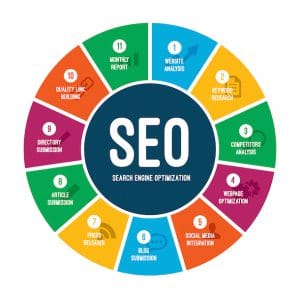More than likely, your business will fail if you don’t implement audience targeting strategies into your business plan. Target marketing is the practice of defining what types of people, called target audiences, are most likely to like your brand and buy your products/services.
Whether you’re a startup or a full-fledged business, using target marketing will cut back on wasted time and money while boosting your return on investment (ROI).
Read on to learn five key audience targeting strategies.
Table of Contents
1. Discover the Right Keywords
Keywords are what people type into a search engine, like Google, or social media when searching for something that relates to your business. If your business can solve their problems, then you want to use the same words your target audience uses. This makes it more likely that you’ll show up when they’re searching for a business like yours.
The right keywords can help you define your own offerings while telling you how to speak like and reach potential buyers.
There are several keyword search tools that can help you find the right words for your concentrated targeting strategy. Our favorite, and one that we use regularly, is SEMrush.
Try this clever Keyword Discovery Tip to quickly pick article topics for your website
2. Emphasize SEO
 Keywords are a small part of SEO, or Search Engine Optimization. SEO consists of practices that help your website rank on the first page of Google search results. This is important because most people don’t scroll past page one.
Keywords are a small part of SEO, or Search Engine Optimization. SEO consists of practices that help your website rank on the first page of Google search results. This is important because most people don’t scroll past page one.
One of the best ways to boost your SEO is by writing consistent and topical blog posts. Blog posts also position your company as a credible authority figure and build trust.
While there are many additional elements beyond keywords that comprise good SEO, these easy-to-implement ones can help your audience targeting strategy:
Links
Links are also an important part of SEO. Backlinks from other websites to your website help to improve your website’s ranking in search engines. In addition, links from your website to other websites can help to increase traffic to your website.
Meta Tags
Meta tags are snippets of text that describe a page’s content. They are used by search engines to help determine what a page is about and whether it is relevant to a user’s search. Meta tags should be included in all of your website’s pages and should be carefully chosen to accurately reflect the page’s content.
Page Title
The title of each page on your website should be unique and descriptive. The title is one of the first things that a user will see when they perform a search, so it is important to make sure that it accurately reflects the page’s content. The title should also include the target keyword for the page.
Headings and Subheadings
Headings and subheadings are used to structure the content on a page. They help to break up text and make it easier for users to scan a page and find the information they are looking for. Headings and subheadings should be used throughout your website’s pages and should include the audience targeting keyword for the page.
Image Alt Text
Image alt text is text that describes an image. It is used by search engines to help determine what an image is about and whether it is relevant to a user’s search. Alt text should be included in all images on your website and should accurately describe the image.
MoreBusiness.com SEO Coaching →
Another bonus to blogs is that they’re shareable, so if someone likes yours enough to share, you can get more people to visit your website and learn about your business.
3. Use Custom Audiences for Ads
Many advertising platforms like Facebook and Google Ads give you the option to set up target audience parameters for your ads. By filling these out, you ensure that your ads are reaching people that fall within your target market and are more likely to buy.
You’ll need to have information regarding your target market’s demographics and psychographics to take full advantage of these features.
Mastering the art of setting up a custom audience for your advertisements on Google or Facebook can seem like an overwhelming undertaking, but it doesn’t have to be.
Getting Started in Two Easy Steps
Follow these two easy steps in order to get started crafting that perfect base of potential customers as part of your audience targeting strategy:
First, decide what type of people you want as part of this demographic: Are they by location? Interests? Age range? Start narrowing down who should see your ad so you’re only targeting qualified leads.
Second, begin gathering information based on the criteria set forward – start making lists with likes/dislikes along with other important data points such as previous purchases made or pages visited online. Once all this is compiled together – voilà-you now have tailored list ready for customized advertisement magic!
4. Retargeting and Lookalike Audiences
 Two of the best target marketing strategies are audience retargeting and lookalike audiences.
Two of the best target marketing strategies are audience retargeting and lookalike audiences.
Retargeting involves targeting people who have already shown interest in your product in some way. Visiting your website is an example of showing interest. Retargeting these audiences can boost ad engagement by 400%.
Retargeting helps businesses increase conversions, brand loyalty, and leads, resulting in a great return on investment (ROI) for their ad spend.
Two examples of success stories from audience targeting include Casper’s mattress company’s ROI of 636% from their audience segmentation strategy and Intuit’s tax software which saw an ROI of 526% by optimizing audience types. It just goes to show that when implemented correctly, audience-oriented retargeting ads lead to great ROI for those companies involved.
Lookalike audiences are people who share similar characteristics or behaviors with people who your marketing has worked on, implying that it’s likely to work on them as well.
And if you’re using social media, you can promote your brand using Instagram marketing and other channels for audience targeting. You can select audiences that follow the influencers who talk about brands like yours.
5. Hire a Target Marketing Agency
If you’re busy running a business, chances are you don’t have the time to develop and implement a complete targeting strategy on your own. That’s where hiring a targeting agency like mediashark can save you wasted time and effort.
Here are 5 questions to ask an agency before you hire them for audience targeting strategies:
- Are you experienced in running online ads for my type of business?
- How do you measure success when it comes to ad campaigns?
- What audience targeting strategies will be used to reach our market and maximize returns on investment?
- Do your services include post-campaign analysis, optimization, and reporting capabilities?
- Have any clients achieved noteworthy results with their digital marketing efforts thanks to working with your agency before now?
A professional agency is able to create a plan for you, adjust it for higher performance, and give you reports that show you what’s working.
Try Out These Targeting Strategies Today
If you’re starting a business, then you need to consider target marketing while developing your business plan. If you already have a business and have yet to implement it, doing so will increase your revenue by a long shot.
Using audience targeting strategies ensures that your marketing efforts are reaching more of the right people with less effort.
If you found this helpful, be sure to check out our business blog and business plan templates (you’ll find them in our navigation menu above).










